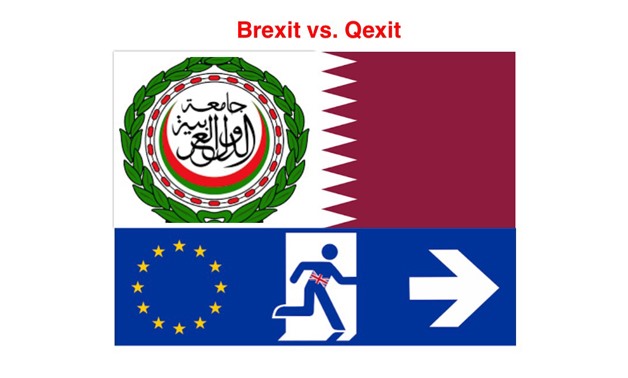
File photo
CAIRO – 10 June 2017: Egypt, Saudi Arabia, the UAE, Bahrain, Libya, Yemen, Mauritania, the Maldives and Mauritius announced this week the severing of ties to Qatar over allegations that the state supports and funds terrorism. These countries closed off their airspace for Qatari airplanes, and closed all ports to Qatari vessels.
The seven Arab countries withdrew their diplomatic missions from Qatar. Jordan, Morocco and Senegal also severed diplomatic ties with Qatar.
Tensions between Qatar and the other states were strained after Qatari Emir Tamim bin Hamad Al-Thani directed a message to four Arab countries - Egypt, the UAE, Saudi Arabia and Bahrain, that being hostile to Iran is unwise.
This escalated move by the six Arab countries may result in freezing Qatar's membership in the Arab League (AL) and the Gulf Cooperation Council (GCC). If this escalated move is taken, Qatar will be isolated and will be forced to abandon the Arab sphere.
2014 Saudi–Qatari rift
Qatar's alleged support for the Muslim Brotherhood across the Arab world, Hamas and radical Islamists in Libya has led to increasing tensions with other Arab states. These tensions came to a head during a March 2014 meeting of the GCC, after which the UAE, Saudi Arabia and Bahrain announced the recall of their ambassadors to Qatar.
Some financial economists have interpreted the 2014 Saudi–Qatari rift as the tangible political sign of a growing economic rivalry between oil and natural gas producers, which could have deep and long-lasting consequences beyond the region.
When the ambassadors withdrew, the GCC was probably already on the verge of a crisis linked to the emergence of distinct political blocs with conflicting interests. Saudi Arabia, the UAE and Bahrain were beginning to engage in a political struggle with Qatar, while Oman and Kuwait represent a non-aligned bloc within the GCC. The ambassadors’ crisis also seriously threatened the GCC’s activities, adversely affected its functioning and could arguably even have led to its dissolution.
Brexit
In 2016, the British government led by David Cameron held a referendum on the U.K.’s withdrawal from the European Union (EU), commonly known as Brexit.
A hairline majority voted to leave the EU. On March 29, 2017, Theresa May's administration invoked Article 50 of the Treaty on the EU in a letter to the President of the European Council Donald Tusk.
Article 50 is a plan for any country that wishes to exit the EU. It was created as part of the Treaty of Lisbon - an agreement signed up to by all EU states which became law in 2009. Before that treaty, there was no formal mechanism for a country to leave the EU. The U.K. is set to leave the union by March 2019.
Britain was not included when the precursor to the EU was formed following World War II, but finally joined the group, known at the time as the European Economic Community, or the Common Market on January 1, 1973.
What is GCC?
The Gulf Cooperation Council (GCC) is a regional intergovernmental political and economic union consisted of all Arab states of the Arab Gulf, except for Iraq. The Charter of the GCC was signed on May 25, 1981.
Qatar is one of the GCC founding member states. In 2011, the Bahraini Foreign Minister called for Egypt to be admitted as a member of the GCC. In May 2011, Jordan's request to join the GCC, which had been first submitted 15 years earlier, was accepted and Morocco was invited to join the union.
Reconciliation meditation attempts
US President Donald Trump on Tuesday linked Arab moves to isolate Qatar to his recent Middle East trip, showing little sympathy for the plight of the Gulf emirate despite its role as a hub for US military operations in the region.
"During my recent trip to the Middle East I stated that there can no longer be funding of Radical Ideology. Leaders pointed to Qatar - look!" Trump wrote on Twitter.
Kuwait, Jordan, Turkey, Russia and France offered mediation to resolve the Arab-Qatari rift. Kuwait's Emir Sheikh Sabah Al-Ahmad Al-Jaber Al-Sabah is acting as a mediator between Doha and some other Gulf Arab states including Saudi Arabia, which have severed diplomatic and transport ties with Doha.
Future scenarios
Some observers assume the next punitive procedure against Qatar by the Arab countries will be the use of military force. I don’t think the U.S. will stop Egypt, Saudi Arabia or the UAE from intervening in Qatar. The military action was expected to be used against Qatar amid the 2014 diplomatic rift with Saudi Arabia.
According to a military cooperation agreement between Qatar and Turkey, Turkey will provide Qatar with military assistance.
For the Arab states, Qatar must not only cut ties with terrorist groups, but it must also shut down its media outlets such as Al Jazeera, which the Arab states say act as a propaganda machine that advances the Qatari agenda.
The terrorist organizations the Arab states are demanding Qatar distance themselves from are the Houthis, the Muslim Brotherhood, Hamas and Al-Qaeda.
Furthermore, Qatar’s ties to Iran must also be severed before they can be brought back into the fold.
Another scenario which has been circulated among the political circles, is the dismissal of Qatar from the GCC. If this takes place, the term Qexit will be widely used as a shorthand. This term refers to a Qatari exit of the GCC or Arab League.
If Qatar wishes to remain a part of the Arab League or the GCC, it will have to discard its regional and international ambitions or be buried alongside them.

Comments
Leave a Comment